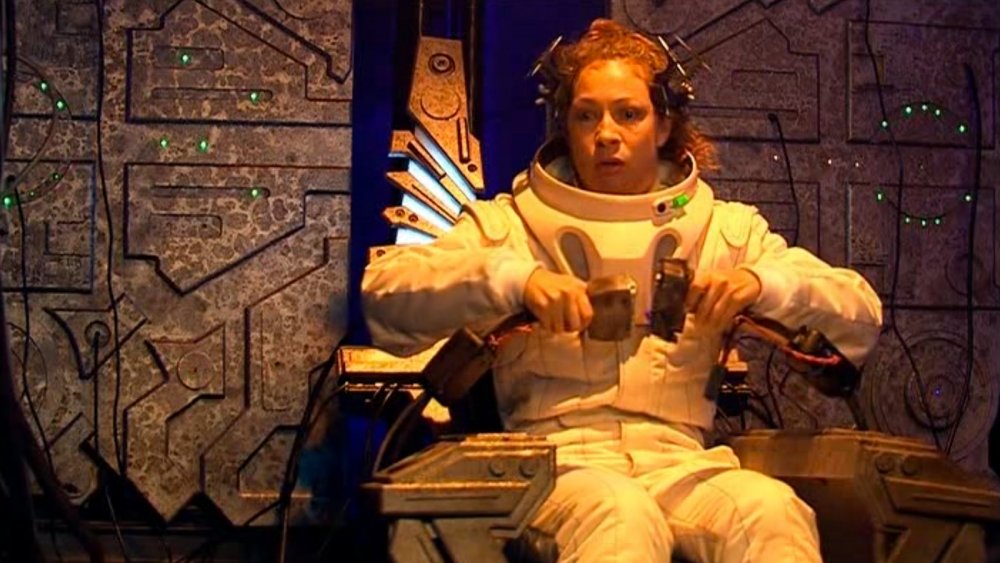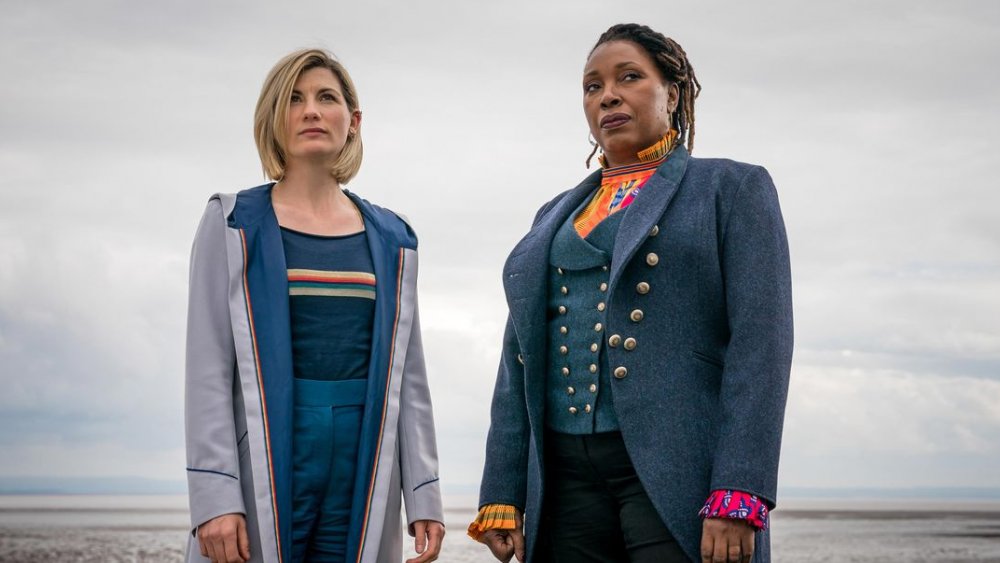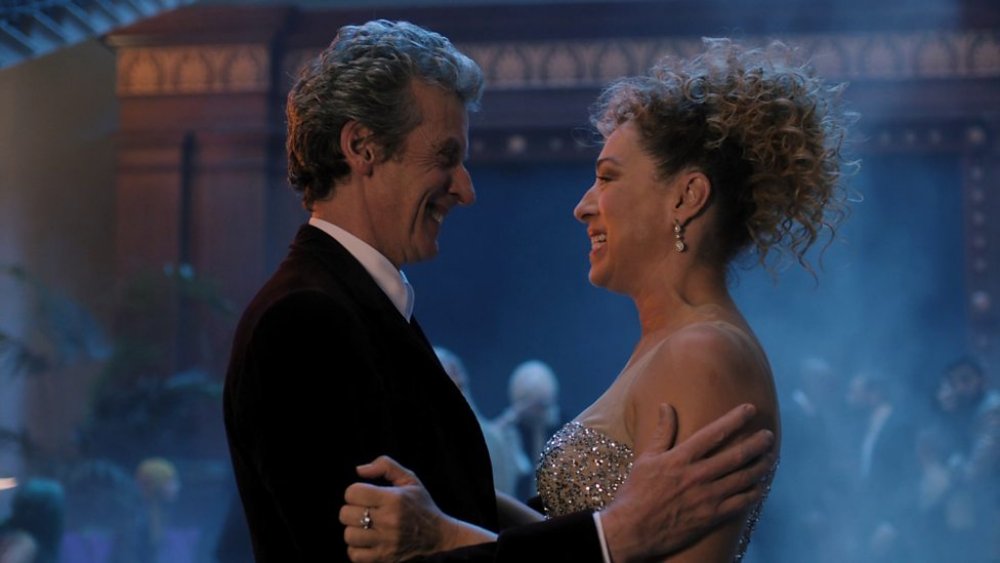The Doctor Who Character We Never Knew Was A Doctor
Steven Moffat is a screenwriter infamous for his tendency to write complex, sometimes even recursive plots on Doctor Who. He's a life-long fan (seriously, he used to be part of a Who usenet group) that just happened to get lucky enough to make his long-held headcanon official content, and it sounds like he still spent a fair amount of time spinning off alternate universes of his own episodes for fun even as he wrote them. Radio Times reports that, in a recent Doctor Who Magazine interview between Moffat and fellow former showrunner Russell T. Davies, Moffat had pitched his own, angsty bit of fan fiction for the bookending episodes "Silence In The Library" and "Forest of the Dead," and that the idea would have completely upended the narrative of the romance between The Doctor and River Song (Alex Kingston).
Moffat describes a fun easter egg he cooked up, saying, "In my head (and ONLY in my head, this will probably never appear on screen, or be confirmed in any way) River's not just his wife — she's his widow. Somewhere in the terrible future, on a battlefield, the 45th Doctor dies in her arms and makes her the same promise she once made him — it's not over for you, you'll see me again ... Until, of course, she ends up in the data core of the Library Planet, and realizes she'll never see him again. And then she starts to wonder why anyone would call a moon 'Doctor.' Ahhh..."
The overall story of The Doctor and River's romance didn't quite turn out that way once Moffat took over as showrunner, but the eternal flexibility of Who's narrative has plenty of room for it. Here's what it means, how that concept, though never fully adapted, makes sense within Doctor Who, and how — in a way — they still got a happy ending kind of like it.
Doctor Moon, the Doctor
In the e-mail pitching the story idea, Moffat imagined that the Doctor, many regenerations hence, would use his final moments to deposit his memory and personality within the sentient satellite-slash-moon that monitors The Library's computer, portrayed in the two episodes by Colin Salmon. The Doctor would recollect this event, though River probably wouldn't due to their Benjamin Button-esque interactions through linear time. In those episodes' story, the descendent of the man who built The Library explained that his grandfather had used the overall concept to memorialize a daughter who had died young, uploading her consciousness to the central computer as a way she might live on in some form.
River Song and her archeological team that died during the arc were also saved, too, in this manner — Moffat simply extended the idea out well beyond the boundaries of the story to bring the entire experience back around again in a neat little causal circle. This way, the Doctor and River can be somewhere together in an idealized facsimile of life, and the Doctor also ensures that the Vashta Nerada crisis in The Library ends ideally, too. What's more, Doctor Moon becomes, cheekily enough, an actual-doctor Doctor. Moffat does love his puns.
Retroactive Doctors are not a new phenomenon
Adding Doctors retroactively is not a new phenomenon in Doctor Who. It's happened before, most recently with the mysterious new addition of a Doctor (Jo Martin) in series 12 — one whose place in the timeline of Doctors and regenerations we currently don't know. It's very possible that she comes from before the First Doctor's (William Hartnell) life, and the entire history of the show will be upended. Once upon a time, Who's rules around Gallifreyans (the species of which The Doctor is a part) meant Time Lords only had 13 regenerations, but the still-elusive events of the Time War introduced in the revival series — and the resultant destruction of Gallifrey, the Time Lords' home world — has given writers more wiggle room to take that limit off of The Doctor's ability to reincarnate.
Beyond that, John Hurt was cast as an intermediary Doctor as part of the 50th anniversary special for the show. He doesn't have an ordinal title like the rest of his kin, and is simply referred to as the War Doctor. He's meant to bridge the canonical gap between the 1996 failed television-special-slash-backdoor-pilot that starred Paul McGann as the Eighth Doctor and the revival series that began in 2005 with Christopher Eccleston as the Ninth Doctor, which did not take the time to explain his regeneration during the hiatus.
Doctor Who's beloved technicalities
This proposed wrinkle, of course, was not how The Doctor and River's story was eventually sewn up, but the core idea was somewhat remixed in what finally came to pass. During Twelve's (Peter Capaldi) era, the storyline with River ended in "The Husbands of River Song", in which the two crash-land onto the planet Darillium. This was the planet River first mentioned in "Forest of the Dead" as the place she would spend her last night with The Doctor. The cheeky bit here, however, is that Darillium's rotation make one "night" as long as 24 years. It's not the same as consciousnesses being uploaded to futuristic computers forevermore, but the episode ends with the impression that The Doctor and River get the long, uninterrupted peace they always wanted together by utilizing the sneaky technicalities of space and time.
Moffat's decade-plus-old e-mail underlines an important factor keeping New Who running the way it has: The dedicated passion of fans who didn't let their interest die. Davies and Moffat are products of a generation of British kids weaned on the back catalog of Who, and watched the original incarnation peter out in the late '80s, just as they were reaching adulthood. Their love, despite original Who's cheap production and cheesy premise, inspired them to become the globally-recognized creatives they are today, and it's because they were genuine about their passion for this nonsensical, earnest sci-fi series about a weirdo that isn't even a real medical doctor. This story being unearthed now between Davies and Moffat proves it: They're just a couple of terminal sci-fi nerds sharing their fan fiction with each other, because apparently getting to write the show's canon themselves didn't occupy quite enough of their time and interest.



